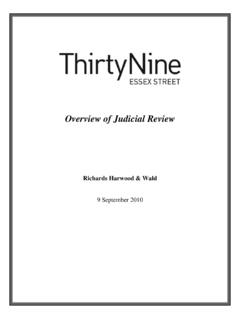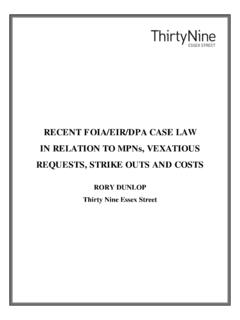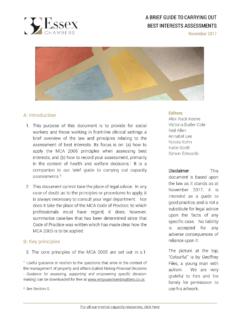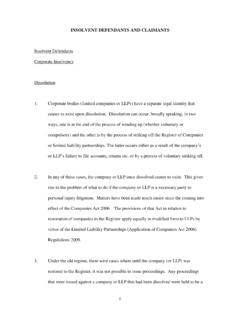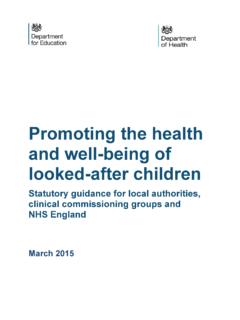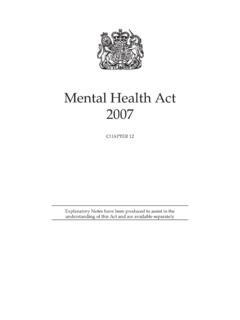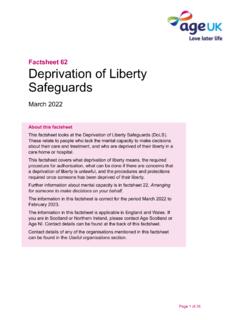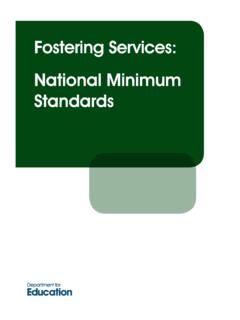Transcription of Deprivation of Liberty after : key questions for social ...
1 Page 1 of 5 Mental Capacity Law Guidance Note A: Is the person objectively deprived of their Liberty or is there a risk that cannot be sensibly ignored that they are objectively deprived of their Liberty ? There are two key questions to ask the acid test : (1) Is the person subject to continuous supervision and control? All of these factors are necessary. You should seek legal advice if intensive levels of support are being provided to any person as part of a package of care or treatment. (2) Is the person free to leave? The focus is not on the person s ability to express a desire to leave, but on what those with control over their care arrangements would do if they sought to leave. NB: for a person to be deprived of their Liberty , they must be subject both to continuous supervision and control and not be free to leave.
2 In all cases, the following are not relevant to the application of the test: (1) the person s compliance or lack of objection; (2) the relative normality of the placement (whatever the comparison made); and (3) the reason or purpose behind a particular placement. The factors identified in the guidance given in the Deprivation of Liberty Safeguards Code of Practice at paragraphs must now be read subject to the decision of the Supreme Court in Cheshire West. However, even if a factor identified there is now no longer relevant toDeprivation of Liberty after Cheshire West: key questions for social workers and medical practitioners Authors Alex Ruck Keene Victoria Butler-Cole Neil Allen Anna Bicarregui Disclaimer: This document is based upon the law as it stands as at March 2014; it is intended as a guide to good practice, and is not a substitute for legal advice upon the facts of any specific case.
3 No liability is accepted for any adverse consequences of reliance upon it. Mental Capacity Law Guidance Note: Deprivation of Liberty Page 2 of 5 the question of whether a Deprivation of Liberty is occurring, it is likely still to be relevant for the purposes of identifying whether the package of care or treatment is the least restrictive option available for the person, whether it is in their best interests and whether either their rights or those of others under (amongst others) Article 8 ECHR are being infringed. Restrictions upon Liberty falling short of a Deprivation of Liberty must also be necessary and proportionate to the likelihood of the person suffering harming and to the seriousness of that harm. To come within the scope of Article 5(1) ECHR, the Deprivation of Liberty must last more than a short period of time but that period can be very short (even as little as half an hour).
4 Emergency situations are dealt with in Section C below. NB: (1) a person who is already subjected to an authorised Deprivation of Liberty (under the DOLS regime, by virtue of a court order under the MCA 2005 or under the MHA 1983) can be further deprived of their Liberty seclusion in a psychiatric hospital. This further Deprivation of Liberty would need separate authorisation. Legal advice should be sought immediately in such scenarios. (2) children can be deprived of their Liberty just as adults but in the ordinary run of events children cared for at home by their parents without state involvement will not be deprived of their Liberty . B: Does the person have capacity to consent to that Deprivation of Liberty ? In answering this question, the focus must be upon the actual regime that will be in place.
5 The question is therefore not an abstract one, and the person must have been given the information relevant to the particular care regime that is proposed (or is already in place). In the case of a Deprivation of Liberty in a psychiatric hospital, it is likely that the relevant information will include: (1) that the patient is in hospital to receive care and treatment for a mental disorder; (2) the core elements of that care and treatment (and in material measures put in place to supervise and control the patient, including searching of the patient and property and the prescription and administration of medication to control their mood); (3) what steps would be taken in respect of searching of the patient and their property; (4) what would happen if the patient tried to leave hospital.
6 Note also that consent must be given freely: particular care must therefore be taken in determining whether an informal patient in a psychiatric hospital has freely given their consent to remaining there. Mental Capacity Law Guidance Note: Deprivation of Liberty Page 3 of 5 C: Are the care arrangements giving rise to the Deprivation of Liberty being made by the state whether local authority or NHS? (1) If yes, then it is irrelevant where the Deprivation of Liberty is taking place whether it is in a care home, a hospital, supported living, or in the adult s own home. (2) If not (for instance, if the arrangements are made by family members within the adult s own home) then consult your legal department immediately as to what steps may be required under the positive obligations imposed by Article 5 ECHR.
7 NB, seek legal advice in respect of children cared for at home where there is local authority/NHS involvement in the delivery of that care, but the actual arrangements for the delivery of care are made by the child(ren) s parents. D: If the patient does not have capacity to consent to a state-arranged Deprivation of Liberty , how can that Deprivation be authorised? 1. Adult in care home Such a person is potentially capable of being made the subject of a standard authorisation under the provisions of Schedule A1 to the MCA 2005 but it is vital to ask whether it is in their best interests, and whether there is a less restrictive option. Where there is a real dispute about where a patient s best interests may lie, the provisions of Schedule A1 must not be used to stifle that dispute, but a decision of the Court of Protection must be sought.
8 NB, there may be a very few situations where it is not possible to authorise the Deprivation of an incapacitated adult s Liberty in a care home under the DOLS regime, where: (1) a short-term Deprivation arises in an emergency situation and an authorisation cannot be sought during the currency of that Deprivation of Liberty ; or (2) the Deprivation of Liberty is not sought for the purposes of securing the person s best interests, but for the protection of others. In either of these cases, legal advice should be sought as soon as possible, but in neither case should seeking such advice stand in the way of providing immediately necessary care and attention to the person. NB, the DOLS regime cannot be used to regulate or restrict contact between the adult and others (whether family members or not): if you wish to regulate or restrict contact, seek legal advice because it is likely this will have to be done by way of a court order.
9 Mental Capacity Law Guidance Note: Deprivation of Liberty Page 4 of 5 2. Adult in or being admitted to hospital for physical treatment Where the sole treatment under consideration at the hospital is physical treatment, the DOLS regime would likely to be appropriate, subject to considerations of best interests and the least restrictive principle. 3. Adult in or being admitted to hospital for mental health treatment A person who lacks capacity to consent to being admitted to hospital for mental health treatment, but who is clearly objecting to it, should generally be treated like someone who has capacity and is refusing to consent to mental health treatment. If it is considered necessary to detain them in hospital, and they would have been detained under the MHA 1983 if they had the capacity to refuse treatment, this is a strong pointer that the MHA 1983 should be used.
10 If there is a genuine choice between the two regimes, which can only be the case of a compliant incapacitated patient, then a value judgment will need to be formed as to the impact of the use of the DOLS regime under MCA 2005 with the impact of detention under the MHA 1983. The question is which the least restrictive way for that patient of best achieving the proposed assessment or treatment? In all cases where the DOLS regime is appropriate, it is vital to ask whether it is in their best interests, and whether there is a less restrictive option. Where there is a real dispute about where a patient s best interests may lie, the provisions of Schedule A1 must not be used to stifle that dispute, but a decision of the Court of Protection must be sought.


